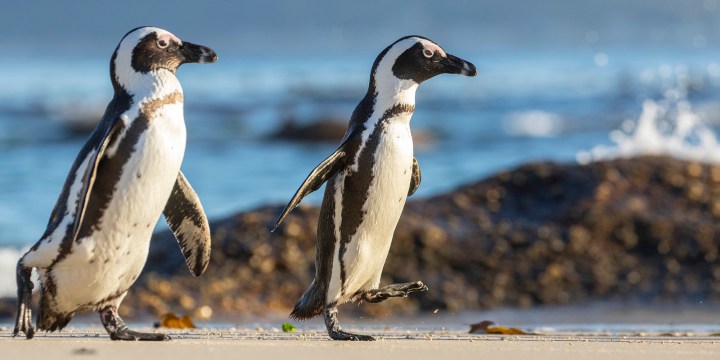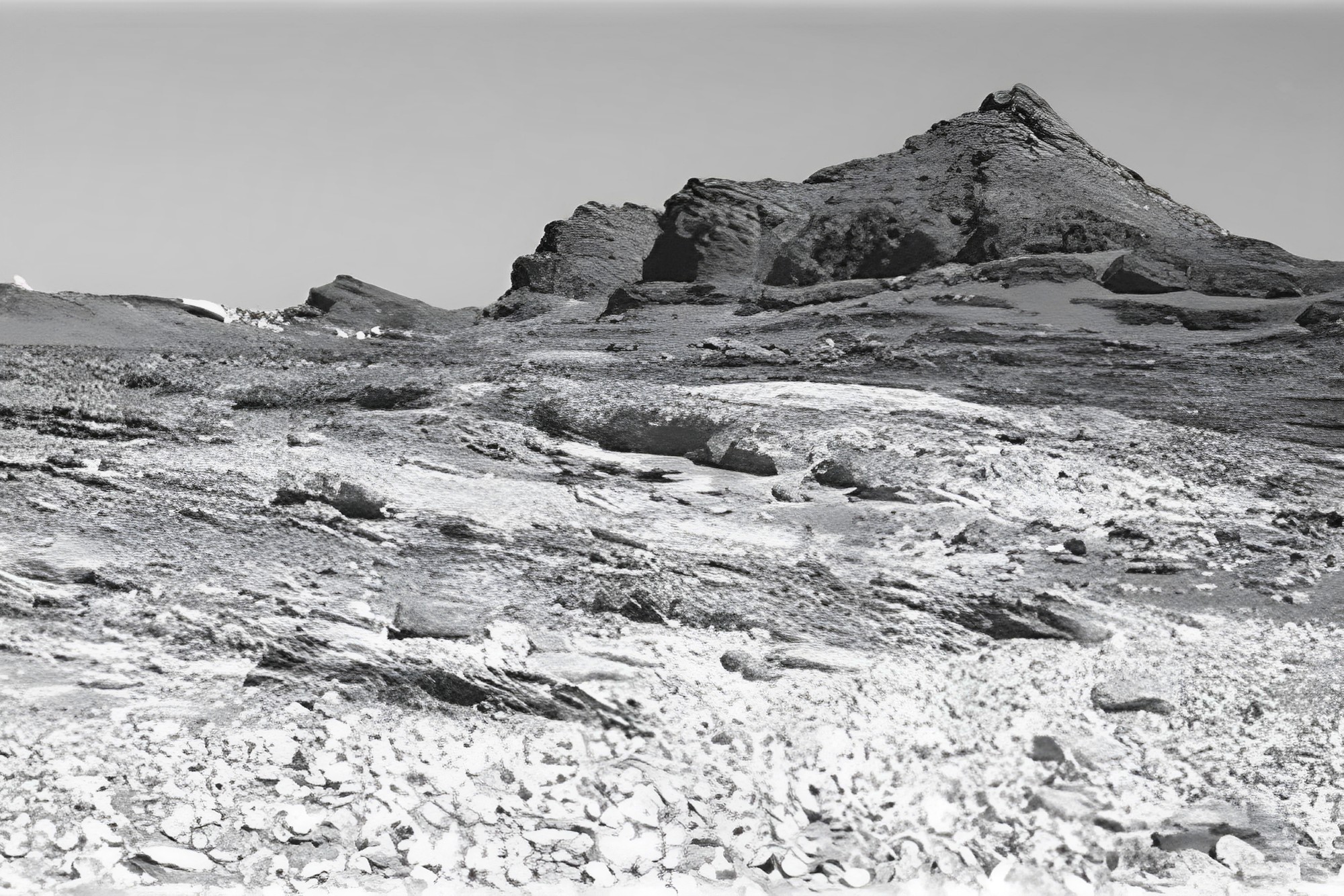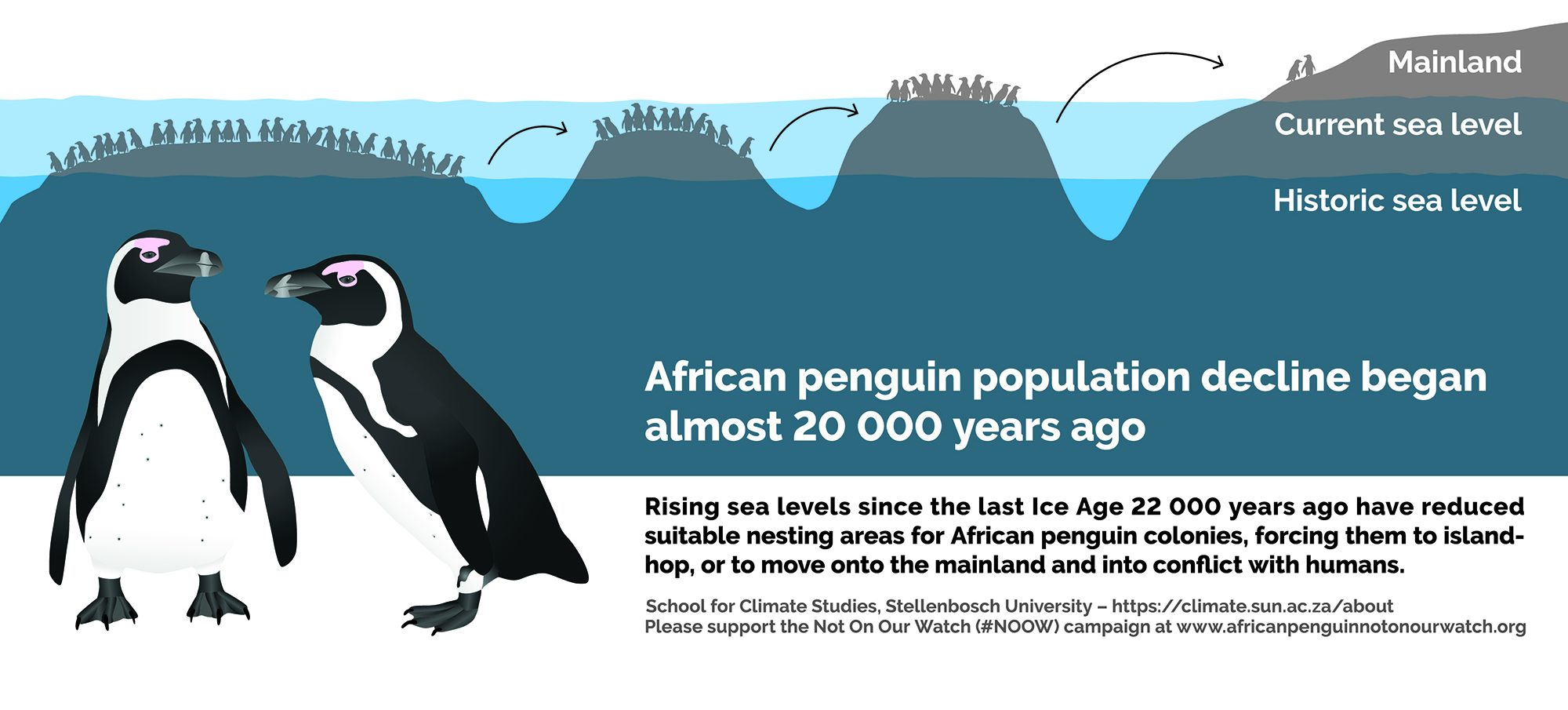CLIMATE CRISIS
Penguins survived multiple crises – but can Africa’s doughty ‘climate refugees’ ride the latest storms?

‘They were hanging on by the skin of their teeth (before the human industrial era) and then we came along and klapped them with guano mining, commercial fishing and now heat stress. We hope their resilience will [carry] them through, but that could depend on how warm the world gets.’ – Professor Guy Midgley, head of Stellenbosch University’s School for Climate Studies
The African penguin – a remarkable sea bird that swims like a fish and waddles on land, but cannot fly – boasted a population of well over 20 million in its glory days.
Largely due to naturally rising sea levels over the last several thousand years, that number had crashed to around 2 million – 5 million survivors at the dawn of humanity’s great industrial era.
As recently as 1910, there were still nearly 1.4 million African penguins breeding and raising a raucous racket on Dassen Island, a tiny three square kilometre chunk of land off the west coast of South Africa.
Today, there are just over 10,000 breeding pairs of this endangered bird species left in the world, scattered across 28 sites along the coast of South Africa and Namibia.
That’s it. Barely enough birds to fill the seats at Newlands Cricket Ground or a small provincial soccer stadium.

The African penguin population has plummeted from over 1 million breeding pairs in the early 1900s to less than 10,400 pairs today. These two photographs of Dassen Island off the West Coast of South Africa in the early 1900s and 2014 are a stark reminder of the near total population collapse of African penguins. (Photo: Cherry Kearton and Christina Hagen, courtesy of the Two Oceans Aquarium, Cape Town, South Africa)

Dassen Island off the West Coast of South Africa. (Photo: Cherry Kearton and Christina Hagen, courtesy of the Two Oceans Aquarium, Cape Town, South Africa)

Halifax Island is a small rocky island off the Namibian coast. (Photo: Eberlanz Museum and Jessica Kemper, courtesy of the Two Oceans Aquarium, Cape Town, South Africa)

Halifax Island. When the first guano (penguin poop) miners arrived at Halifax, the guano levels were reported to be piled up to a depth of nearly 37 metres. (Photo: Eberlanz Museum and Jessica Kemper, courtesy of the Two Oceans Aquarium, Cape Town, South Africa)
The main reason for this dramatic historical decline is that African penguins have run out of suitable nesting and breeding spaces, according to a new study by climate and zoology researchers at Stellenbosch University.
The Stellenbosch study, based on an analysis of sea levels off the Southern African coastline over the past 22,000 years, suggests that there has been a tenfold reduction in suitable nesting habitat for penguins over this period, sending their population numbers into steep decline.
Unlike species that were able to retreat to higher land as sea levels rose naturally, the breeding grounds of penguins were largely stranded on small islands (spaces where eggs and chicks were safe from land-based predators).
As more and more islands were inundated by rising sea waters, penguins had to resort to “island-hopping” in their search for alternative areas to breed in safety.
At the same time, the new breeding grounds had to be located in areas of relatively cold sea water because penguins feed mainly on sardines and anchovies, which are restricted to areas where the sea surface temperatures are between 12 and 24°C.
Dr Heath Beckett, a postdoctoral fellow at Stellenbosch and first author of the study, explained that it was this combination of very specialised needs (suitable breeding sites on predator-free islands and their dependence on cold-water fish) that decimated the population of these ancient “climate refugees” over time.
They could not flee northwards towards the warmer waters of the equator.
Beckett believes that by providing new insights into the historic decline of these birds, the latest study should help to guide current extinction-risk assessments – especially at a time when this endangered species faces a new range of threats from the human-induced climate crisis and other modern pressures such as competition for fish food or underwater noise from ships and seismic blasting.

Taking into account rising sea levels over the past several thousand years, Stellenbosch University researchers identified 220 islands which would have provided suitable nesting conditions for penguins – but most have now disappeared due to the historic rise in sea levels. (Infographic: Stellenbosch University School for Climate Studies)
Professor Guy Midgley, head of Stellenbosch University’s School for Climate Studies, notes that this is the last surviving penguin species in Africa, with 97% of the South African population now supported by only seven breeding colonies.
“This bird is a total survivor, and, given half a chance, they will hang on. Island-hopping saved it in the past … they know how to do this,” he said.
But, he noted, current extinction risk assessments had not taken account of the fact that penguins had already experienced a major historic collapse.
“Now we are putting them at further risk when they are already at the limits of existence,” Midgley warned.
“They were hanging on by the skin of their teeth (before the human industrial era) and then we came along and klapped them with guano mining, commercial fishing, and now, heat stress. We hope their resilience will take them through … but that could depend on how warm the world gets.”
With several new threats – rising sea temperatures, competition from the commercial fishing industry and humanity in general for the same food source – he fears that African penguins (and several other forms of marine life) “may not stand a chance”.
On a more optimistic note, Midgley suggests that attempts to establish new land-based colonies, such as De Hoop Nature Reserve, could provide some relief, but that such relocation projects could only bear fruit if the birds were protected from predators and guaranteed “sufficient access to marine food resources”.
In a separate research study published last year, Nelson Mandela University scientist, Dr Tegan Carpenter-Kling, highlighted a further, unique vulnerability for penguins – a phenomenon known as the annual “catastrophic moult”.
Carpenter-Kling and her colleagues caution that current conservation plans for African penguins focus mainly on reducing competition with purse-seine fisheries, during the breeding season.
“However, penguins also undergo an annual catastrophic moult when they are unable to feed for several weeks. Before moulting, they must accumulate sufficient energy stores to survive this critical life-history stage.
“For penguins, the energy demands of this period are particularly intense as, unlike other seabirds which stagger their moult, penguins replace their entire plumage in two to five weeks, in a so-called catastrophic moult.”
While moulting, penguins are land-bound and entirely dependent on fat reserves, resulting in a 40%-50% loss in body mass over the moult period.
She noted that penguins starved to death if they did not have sufficient fat reserves to complete the moult and return to sea. Therefore, it was critical for the birds to have sufficient access to fish throughout the year – not just in the breeding season. DM/OBP





















Comments - Please login in order to comment.